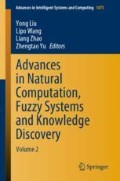Abstract
We propose a novel random number or random sequence generator using a set of large exponential numbers. The decimal pattern of an exponential number is first defined which demonstrates high level of uniformity. We can apply a set of decimal patterns to form a codeword Matrix for generating random numbers and sequences. Simulation results show that pattern with length larger than 100 can reach to \(99.9\%\) uniformity level if decimal digits are transformed into binary data. This provides potential capability for the codeword Matrix to serve as the entropy source for cryptography applications.
Access this chapter
Tax calculation will be finalised at checkout
Purchases are for personal use only
References
Schneier, B.: Applied Cryptography: Protocols, Algorithms, and Source Code. Wiley, Hoboken (2007)
Garcia-Bosque, M., Perez, A., Sanchez-Azqueta, C., Celma, S.: Sensors. Application of a MEMS-based TRNG in a chaotic stream cipher 17(3), 646–652 (2017)
Click, T.H., Liu, A.B., Kaminski, G.A.: Quality of random number generators significantly affects results of Monte Carlo simulations for organic and biological systems. J. Comput. Chem. 32(3), 513–524 (2010)
Borna, M., Madani, M.H.: New methods for enhancing fine acquisition in dual folding algorithm of long pseudo noise codes. Int. J. Commun. Syst. 31(1), e3377 (2018)
van der Linden, R., Lopes, R., Bidarra, R.: Procedural generation of dungeons. IEEE Trans. Comput. Intell. AI Games 6(1), 78–89 (2014)
Mulaosmanovic, H., Mikolajick, T., Slesazeck, S.: IEEE Electron. Device Lett. Random number generation based on ferroelectric switching 39(1), 135–138 (2018)
Petrie, C.S., Connelly, J.A.: A noise-based IC random number generator for applications in cryptography. IEEE Trans. Circuits Syst. I Fundam. Theory Appl. 47(5), 615–621 (2000)
Chang, H.-H., Lin, S.-C., Lee, C.-D.: A CDMA scheme based on perfect Gaussian integer sequences. AEÜ Int. J. Electron. Commun. 75, 70–81 (2017)
Author information
Authors and Affiliations
Corresponding author
Editor information
Editors and Affiliations
Rights and permissions
Copyright information
© 2020 Springer Nature Switzerland AG
About this paper
Cite this paper
Chang, HH. (2020). Generation of Random Sequences Based on Exponential Numbers. In: Liu, Y., Wang, L., Zhao, L., Yu, Z. (eds) Advances in Natural Computation, Fuzzy Systems and Knowledge Discovery. ICNC-FSKD 2019. Advances in Intelligent Systems and Computing, vol 1075. Springer, Cham. https://doi.org/10.1007/978-3-030-32591-6_71
Download citation
DOI: https://doi.org/10.1007/978-3-030-32591-6_71
Published:
Publisher Name: Springer, Cham
Print ISBN: 978-3-030-32590-9
Online ISBN: 978-3-030-32591-6
eBook Packages: Intelligent Technologies and RoboticsIntelligent Technologies and Robotics (R0)

